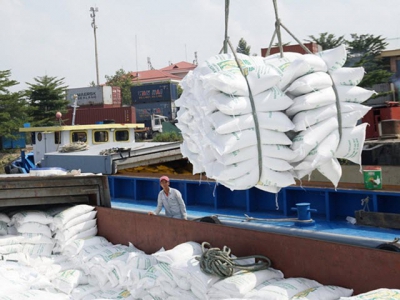Growing demand for Vietnamese rice in Africa

Vietnam’s rice exports to African countries have increased and are expected to remain on the rise for the rest of 2020 and in 2021 as well.
Vietnam’s rice exports to Africa are expected to grow further
The African market, especially West Africa, has high demand for rice imports due to insufficient local supply resulting from natural disasters, poor crops, political instability and epidemics.
According to the Vietnam Trade Office in Algeria, also in charge of trade with Gambia, Mali, Niger and Senegal, Algeria depends almost totally on rice imports because the country does not cultivate rice. Algerian people rarely eat rice but the growing number of Asian workers in the country, especially those from China, has contributed to increased demand for rice there. Algeria imports about 100,000 tonnes of rice per year, mostly long grain white rice (five percent broken). Rice accounts for a mere one percent of food consumption in Algeria. Vietnamese rice currently has to compete with products of India, Thailand, Pakistan, Tadjikistan, Uruguay and China. In 2019, Vietnam exported 16,394 tonnes of rice worth US$6.28 million to Algeria, a rise of 20.8 percent in value compared with 2018. In the first half of this year, the export value reached US$14.58 million, up 18 times and accounting for 58 percent of total export value to this northwestern African nation.
Since 1995, Senegal has eliminated the state monopoly and fully liberalized rice imports. Due to droughts, domestic production meets only about 20 percent of actual demand, and the country has to import 700,000-800,000 tonnes of rice annually, mostly broken rice. In 2019, Vietnam exported 96,665 tonnes of rice worth more than US$32.62 million to Senegal, up 13.1 times in volume and 10.2 times in value compared with 2018. In the first seven months of this year, Vietnam exported US$26.47 million worth of goods to this market, up 77.2 percent compared with the same period last year. While the export value of most other products decreased, rice exports grew more than 18 times, reaching US$14.7 million. In this market, Vietnamese rice has to compete with products of India, Pakistan, Thailand, China, Brazil, Argentina, Uruguay, the US, Malaysia and Cambodia.
According to the US Department of Agriculture, Senegal may have to import 1.25 million tonnes of rice in 2020. The Vietnam Trade Office in Algeria has kept a close watch on changes in trade policies of African countries as well as their demand for rice, import regulations and payment requirements, especially in the context of Covid-19. Domestic companies can find updated information about these changes, as well as lists of rice importers, on the website of the Ministry of Industry and Trade.
In 2020, the Asia-Africa Market Department of the Ministry of Industry and Trade has coordinated with Vietnamese trade offices in foreign countries to organize online workshops introducing the potential of the African and Middle Eastern markets, attracting participation of hundreds of Vietnamese companies.
Related news
 Mushroom farming brings prosperity in Bắc Ninh
Mushroom farming brings prosperity in Bắc Ninh After investing VNĐ100 million (US$4,300) to grow mushrooms in a 300 sq.m workshop in 2015, a family in the northern province of Bắc Ninh earned VNĐ150 million
 Vietnamese agricultural products struggle to enter supermarkets
Vietnamese agricultural products struggle to enter supermarkets Although it is an agricultural powerhouse, many Vietnamese agricultural products which are sparsely imported in supermarkets to compete in the domestic market
 Farm exports to EU face name recognition, standards challenges
Farm exports to EU face name recognition, standards challenges The protection offered by the European Union to 39 unique Vietnamese products under a newly activated trade pact opens the door to Vietnam’s agriculture